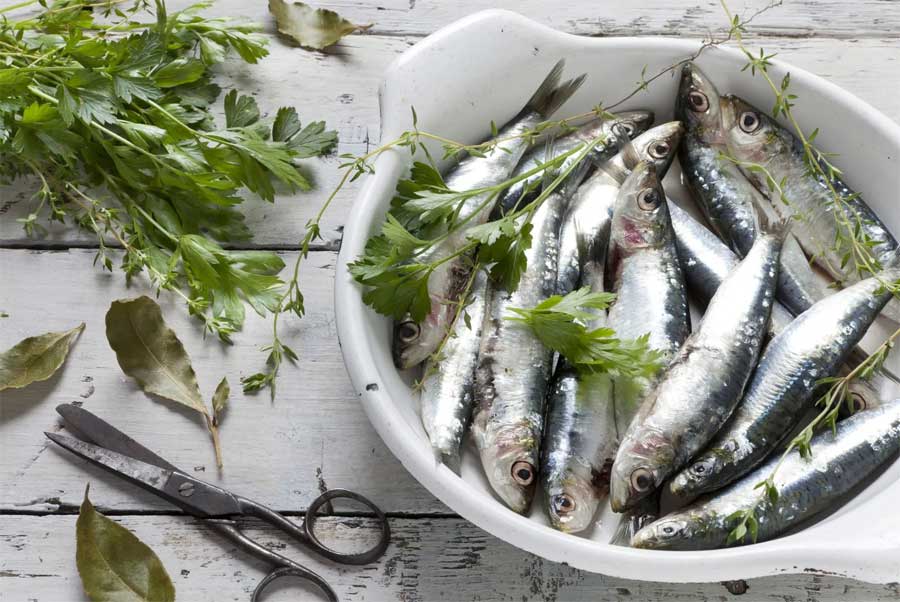Discover 7 unexpected health benefits of eating sardines, including improved heart and brain health, reduced inflammation, and more. If you are one of the lovers of this sardines fish, please read more of this article till the end.
Sardines are a type of small, oily fish that are typically found in the Mediterranean, Atlantic, and Pacific oceans. Though they are often thought of as cheap and low-quality food, sardines are actually quite nutritious and offer a number of health benefits.
Some of the most important nutrients in sardines include omega-3 fatty acids, protein, vitamin D, calcium, and iron. These nutrients are essential for maintaining a healthy body and preventing chronic diseases.
Sardines Nutrition Value
Before we see the health benefits of eating sardines fish, let’s first see the nutrition value. Sardines have been around for centuries and have been a staple in many cultures.
They are small, oily fish that are high in protein and omega-3 fatty acids. Sardines are a nutrient-dense food and are an excellent source of vitamins and minerals.
Here are Some Sardines Facts Nutrition:
– Sardines are a good source of protein. One can of sardines contains about 23 grams of protein.
– Sardines are also a good source of omega-3 fatty acids. One can of sardines contains about 1.5 grams of omega-3 fatty acids.
– Sardines are a good source of vitamin B12. One can of sardines contains about 2.5 micrograms of vitamin B12.
– The sardines are also a good source of selenium. One can of sardines contains about 30 micrograms of selenium.
– Sardines are a good source of niacin. One can of sardines contains about 4 milligrams of niacin.
– Sardines are also a good source of phosphorus. One can of sardines contains about 300 milligrams of phosphorus.
– This fish also a good source of vitamin D. One can of sardines contains about 10 micrograms of vitamin D.
– Sardines are also a good source of calcium. One can of sardines contains about 200 milligrams of calcium.
– Sardines are a good source of iron. One can of sardines contains about 2.5 milligrams of iron.
Here Are 7 Health Benefits of Eating Sardines
1. Health Benefits of Sardines for Heart Health
Sardines are small, oily fish that are packed with nutrients. Just a few of the many sardines benefits include improved heart health, better brain function, and stronger bones.
One of the best things about sardines is that they’re affordable, easy to find, and can be incorporated into a variety of recipes. Whether you enjoy them as part of a salad, in a sandwich, or straight out of the can, sardines are a delicious and nutritious way to add more seafood to your diet.
Sardines are an excellent source of omega-3 fatty acids. In fact, just 3 ounces of sardines provides over 50% of the recommended daily intake for omega-3s.
Omega-3 fatty acids are beneficial for heart health in a few ways. They can help to lower blood pressure and heart rate, reduce triglyceride levels, and decrease the risk of abnormal heart rhythms. All of these effects can help to keep the heart functioning optimally and reduce the risk of heart disease.
In addition to omega-3s, sardines are also a good source of CoQ10. This nutrient is important for energy production in the cells and also has antioxidant properties. CoQ10 has been shown to help lower blood pressure and improve heart function in people with heart diseases.
There are many reasons to add sardines to your diet. These small, oily fish are an excellent source of omega-3 fatty acids, CoQ10, calcium, and other nutrients that are important for overall health. Including sardines as part of a healthy diet can help to improve heart health, brain function, and bone health.
2. Improved Brain Health with Sardines
Sardines are small, oily fish that are packed with nutrients. Although they are often overlooked, sardines are a nutritional powerhouse and eating them regularly has many health benefits.
One of the main benefits of eating sardines is that they are great for your brain health. The omega-3 fatty acids found in sardines are essential for cognitive function and brain health. Studies have shown that omega-3s can help to improve memory, reduce inflammation, and protect the brain from age-related damage.
In addition to being good for your brain, sardines are also packed with other nutrients that are essential for good health. They are a good source of protein, vitamins, and minerals. Sardines are also low in mercury, making them a safer choice of fish to eat than some of the larger species.
If you’re looking to improve your overall health, eating sardines regularly is a great place to start. Not only are they good for your brain, but they offer a host of other benefits as well. Give them a try today!
3. Inflammation Reduction with Sardines
If you’re looking to reduce inflammation, you might want to consider adding sardines to your diet. Sardines are a type of small, oily fish that are packed with nutrients, including omega-3 fatty acids, which are known for their anti-inflammatory properties.
Sardines are a great source of omega-3 fatty acids, which have been shown to reduce inflammation. In fact, studies have shown that omega-3 fatty acids can help to reduce the risk of inflammatory diseases, such as Crohn’s disease, rheumatoid arthritis, and asthma.
What’s more, sardines are also a good source of other nutrients, such as protein, vitamin D, and calcium. All of these nutrients are important for reducing inflammation.
So, if you’re looking to reduce inflammation, be sure to add sardines to your diet. You can enjoy them grilled, smoked, or canned.
4. Benefits of Sardines for Vision
Sardines are a small, oily fish that is packed with nutrients. These little fish are a great source of protein, omega-3 fatty acids, vitamins, and minerals. All of these nutrients are important for maintaining good health, but they are also vital for keeping your eyes healthy.
There are many different nutrients in sardines that are good for your eyesight. Omega-3 fatty acids are important for maintaining the health of the cell membranes in your eyes. These fatty acids also help to reduce inflammation throughout the body, including in the eyes.
Vitamin A is another nutrient that is important for vision. This vitamin helps to produce pigment in the retina of the eye, which is important for both daytime and nighttime vision. Vitamin A also helps to protect the surface of the eye from infection.
Sardines are also a good source of the mineral zinc. Zinc is important for the health of the eye because it helps to protect the retina from damage. It also helps to maintain the clarity of the cornea.
There are many other nutrients in sardines that are good for overall health, but these are some of the most important for vision. If you are looking for a food that is packed with nutrients and good for your eyesight, sardines are a great option.
5. Sardines and Improved Bone Health
Sardines are a type of small, oily fish that are typically found in the Mediterranean Sea. They are a popular food choice in many countries and are known for their high levels of nutrients, including omega-3 fatty acids, vitamin D, and calcium. All of these nutrients are important for bone health.
Omega-3 fatty acids are essential for maintaining bone density. They help to reduce inflammation in the body and also play a role in the development of new bone tissue. Vitamin D is also essential for bone health. It helps the body absorb calcium, which is necessary for strong bones. Calcium is the most abundant mineral in the human body and is essential for bone development and maintenance.
Sardines are an excellent source of all of these nutrients and can be a helpful addition to the diet for those who are looking to improve their bone health.
6. Sardines contain Vitamins A, B 12 and D
Sardines are a small, oily fish that is often eaten as a healthy snack or part of a meal. Though they are small, sardines are packed with nutrients, including vitamins A, B 12 and D.
Vitamin A is important for maintaining good vision, while vitamin B 12 is essential for the formation of red blood cells. Vitamin D is important for bone health.
Sardines are also a good source of protein and omega-3 fatty acids, which are beneficial for heart health.
If you’re looking for a healthy snack or meal option, consider incorporating sardines into your diet.
7. Contain Antioxidants
Sardines are small, oily fish that are packed with nutrients. They are a good source of protein, omega-3 fatty acids, vitamins, and minerals. Sardines are also one of the best sources of antioxidants.
Antioxidants are nutrients that help protect your cells from damage. They are found in many foods, including fruits, vegetables, nuts, and seeds. The antioxidants in sardines include vitamin E, selenium, and zinc.
Vitamin E is a fat-soluble vitamin that helps protect your cells from damage. It is found in foods like nuts, seeds, and vegetable oils. Selenium is a mineral that helps to protect your cells from damage. It is found in foods like fish, meat, and eggs. Zinc is a mineral that helps to protect your cells from damage. It is found in foods like oysters, meat, and poultry.
The antioxidants in sardines help to protect your cells from damage. They may also help to prevent some chronic diseases, such as cancer and heart disease.
Ways to Incorporate Sardines into Your Diet
Sardines are small, oily fish that are packed with nutrients. They are a good source of protein, omega-3 fatty acids, vitamin B12, selenium, and phosphorus. Sardines are often canned, but they can also be found fresh. Here are some ways to incorporate sardines into your diet:
- Add them to a salad.
- Make a sardine pasta dish.
- Top pizza with sardines.
- Add them to a sandwich or wrap.
- Sardine pâté is a delicious way to enjoy sardines.
- Rillette is a French dish made with shredded sardines, herbs, and spices.
- Make a sardine spread by mashing sardines with olive oil, lemon juice, and garlic.
- Sardines can be grilled, baked, or smoked.
- Try them in a traditional Spanish dish like espetadas.
- Enjoy sardines the Mediterranean way by marinating them in olive oil, lemon juice, and herbs.
Understanding Mercury Levels in Sardines
Most people know that they should be eating fish for the health benefits. Fish is a good source of protein and omega-3 fatty acids, which are important for heart health. But some fish contain high levels of mercury, which can be harmful to your health. So, how do you know if the fish you’re eating is safe?
Sardines are small, oily fish that are low in mercury. This makes them a good choice for people who are looking to add fish to their diet. However, it’s important to understand that not all sardines are created equal. Some sardines may have higher mercury levels than others, depending on where they were caught and what they were eating.
The best way to reduce your exposure to mercury is to choose fish that are low in mercury. This means opting for smaller, younger fish instead of older, larger fish. It also means avoiding fish that are known to be high in mercury, such as sharks, swordfish, and king mackerel.
When it comes to sardines, the FDA has set a limit of 0.1 parts per million (ppm) of mercury in canned fish. This limit is based on studies that have shown that eating canned fish with this level of mercury is safe for most people.
However, it’s important to note that this limit is not a safety limit for all people. Some groups of people, such as pregnant women and young children, are more sensitive to the effects of mercury and should avoid fish with high mercury levels.
If you’re concerned about mercury in sardines, there are a few things you can do to reduce your exposure. First, choose sardines that are canned in water instead of oil. This will help to reduce the amount of mercury that is absorbed by the fish.
Second, look for brands of sardines that are certified by an independent organization, such as the Marine Stewardship Council. This certification ensures that the fish have been caught in a sustainable way and are low in mercury.
Finally, be sure to check the nutrition label on the cans of sardines you buy. This will tell you how much mercury is in each serving. Choose brands that have lower levels of mercury, and limit your intake of sardines to no more than one serving per week.
By following these tips, you can enjoy the health benefits of sardines without exposing yourself to too much mercury.
Advantages of Eating Wild-Caught Sardines
Most of us are familiar with the many advantages of eating fish. Fish is a great source of protein and is low in saturated fat. It is also a good source of omega-3 fatty acids, which are beneficial for our heart health. One type of fish that is often overlooked is the sardine. Sardines are a small, oily fish that is high in nutrients and has many health benefits.
Sardines are a good source of protein, vitamins, and minerals. They are also low in mercury and other toxins. Wild-caught sardines are the best choice, as they are usually lower in mercury than farm-raised sardines. Wild-caught sardines are also a sustainable choice, as they are not overfished like some other types of fish.
Sardines are a great source of omega-3 fatty acids. Omega-3 fatty acids are beneficial for our heart health and have also been shown to reduce inflammation. Inflammation is linked to many chronic diseases, such as heart disease, arthritis, and cancer. Omega-3 fatty acids are also essential for brain health and development.
The nutrient density of sardines makes them a great choice for people who are trying to lose weight or maintain a healthy weight. Sardines are a filling food and can help to reduce cravings for less healthy foods.
There are many ways to incorporate sardines into your diet. They can be eaten fresh, canned, or smoked. Fresh sardines are the best choice, as they have the highest nutrient content. Canned sardines are a convenient option and can be added to salads, sandwiches, and pasta dishes. Smoked sardines can be enjoyed as a snack or added to other dishes for flavor.
If you are looking for a nutritious and delicious fish to add to your diet, look no further than wild-caught sardines!
Selecting High-Quality Sardines
When it comes to choosing the best sardines, there are a few things you need to keep in mind. First, you want to make sure that you select sardines that are high in nutrition. This means that you should look for sardines that are rich in omega-3 fatty acids, as well as other essential nutrients. Second, you want to choose sardines that are fresh and of high quality. This means that you should avoid sardines that have been sitting on shelves for too long, as they will not be as fresh and may not be as nutritious. Finally, you want to make sure that you select sardines that are low in mercury. This is important because mercury can be toxic and can cause serious health problems.
When it comes to nutrition, sardines are an excellent source of omega-3 fatty acids. Omega-3 fatty acids are essential for good health, and they have been shown to have numerous health benefits, including reducing inflammation, improving heart health, and boosting brain function. In addition to omega-3 fatty acids, sardines are also a good source of protein, vitamins, and minerals.
When it comes to freshness, it is important to choose sardines that have been caught recently. This is because the longer sardines sit on shelves, the less fresh they will be. If you can, try to find sardines that have been caught within the last few days. If you cannot find fresh sardines, you can also look for frozen sardines, which will be almost as fresh as those that are fresh-caught.
Finally, you want to make sure that you select sardines that are low in mercury. Mercury is a toxic metal that can cause serious health problems. Fortunately, most sardines contain very low levels of mercury. However, it is still important to check the label to make sure that the sardines you are buying are low in mercury.
By following these tips, you can be sure that you are selecting high-quality sardines that are nutritious and fresh.
The Bottom Line on the Health Benefits of Eating Sardines
Are sardines good for you? It’s a question that seems to be on a lot of people’s minds these days.
Sardines are small, oily fish that are rich in nutrients like omega-3 fatty acids, vitamin D, and calcium. They’re also a good source of protein and have a low mercury content.
All of these factors make sardines a nutritious and healthy food choice. In fact, eating sardines has been linked with a number of health benefits.
Here’s a look at the science-backed health benefits of eating sardines:
– May promote heart health
The omega-3 fatty acids in sardines can help promote heart health by reducing inflammation, lowering blood pressure, and improving cholesterol levels.
– May boost brain health
The omega-3 fatty acids in sardines are also good for your brain. They can help improve cognitive function, reduce inflammation, and protect against age-related cognitive decline.
– May support bone health
Sardines are a good source of calcium and vitamin D, two nutrients that are essential for bone health. Calcium helps build and maintain bone mass, while vitamin D helps the body absorb calcium.
– May improve joint health
The omega-3 fatty acids in sardines can also help reduce inflammation and pain in joints. This may be especially beneficial for people with arthritis.
– May boost eye health
The omega-3 fatty acids in sardines may help protect against age-related macular degeneration, a leading cause of blindness.
– May promote skin health
The omega-3 fatty acids in sardines can help keep your skin healthy by reducing inflammation and protecting against sun damage.
– May boost immunity
The nutrients in sardines can help boost immunity and protect against infections. Vitamin D, in particular, is essential for a strong immune system.
– May aid weight loss
Despite being high in calories, the protein and healthy fats in sardines can help you feel full and satisfied. This may help you eat less throughout the day and lose weight.
– May improve pregnancy and infant health
The omega-3 fatty acids in sardines are essential for pregnant women and growing babies. They can help improve pregnancy outcomes and infant brain development.
– May reduce the risk of cancer
The nutrients in sardines may help protect against cancer. The omega-3 fatty acids, for example, can help reduce inflammation, while the selenium in sardines may help protect cells from damage.


















